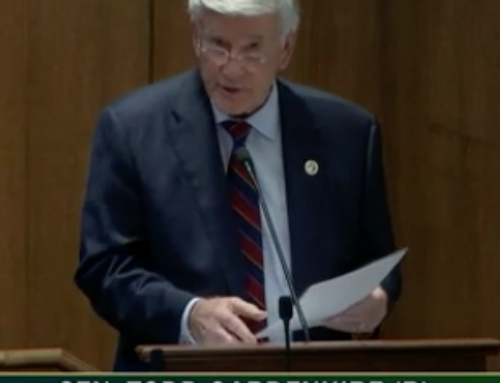Memphis considers using code names for companies getting economic development incentives
The Economic and Development Growth Engine Board for Memphis (EDGE) is seeking at Attorney General’s opinion on whether it can use code names to keep secret from the public the identity of companies before it votes to award the companies government cash grants and other economic development incentives.

Al Bright chairman of the Memphis Economic Development and Growth Engine, said if using code names for companies when voting on cash grants and incentives instead of publicly disclosing identities would encourage more businesses to come to Memphis, “by all means, we need to do it.”
The attorney for the board told the Commercial Appeal (Companies seeking tax breaks from Memphis might be hidden from public via ‘code names’) that it wants to make sure it is not violating state law, which requires that the board “publicly disclose the proposed contract or agreement in a manner that would adequately notify and fairly inform the public of the proposed contract or agreement before voting on the proposal.”
The statute in question was passed by the Legislature in 2017. It was prompted by the city of Spring Hill who complained that competing cities could file open records requests and find out which companies it was negotiating with and terms of ongoing negotiations.
The law that passed as a result allows cities and counties and their economic development programs to keep confidential proposed contracts and agreements related to incentives, and all associated documents, until the proposed agreement was shared with members of a governing body in advance of a vote.
Its sponsors were state Rep. Sam Whitson, R-Franklin, and state Sen. Joey Hensley, R-Hohenwald. They described the purpose as allowing confidentiality during the negotiations until general terms had been reached, and a proposed contract or agreement was ready and given to members of a governing body. At that point, the contract and “all supporting records and documentation” would become subject to disclosure upon a public records request under the Tennessee Public Records Act.
Governing bodies must “adequately notify and fairly inform the public”
In addition, the governing body has to publicly disclose the contract and agreement “in a manner that would adequately notify and fairly inform the public of the proposed contract or agreement before voting on the proposal.” In other words, they had to provide adequate and fair notice of what they are voting on before voting.
Here is the full statute for municipalities (it is the same wording for the counties):
6-54-142. Contracts and agreements of economic and community development program as public record.

State Rep. Sam Whitson, R-Franklin, included in his bill a requirement that a governing body must “adequately notify and fairly inform the public” of any proposed economic development incentives contract or agreement before voting on the proposal.
(a) Except as otherwise provided in this section, any contract or agreement, together with all supporting records and documentation, that obligates public funds as part of a municipality’s economic and community development program to assist new and existing businesses and industries in locating or expanding in the municipality is a public record subject to title 10, chapter 7, part 5, and open for public inspection as of the date such contract or agreement is made available to members of the governing body. A governing body shall publicly disclose the proposed contract or agreement in a manner that would adequately notify and fairly inform the public of the proposed contract or agreement before voting on the proposal.
(b) This section does not apply to trade secrets received or maintained by a municipality. All such trade secrets are confidential.
(c) This section does not apply to company documents or records containing marketing information or capital plans that are provided to a municipality with the understanding that they are confidential. Any such document or record is confidential until such time as the provider thereof no longer requires its confidentiality.
(d) As used in this section:
(1) “Capital plans” means plans, feasibility studies, and similar research and information that will contribute to the identification of future business sites and capital investments;
(2) “Marketing information” means marketing studies, marketing analyses, and similar research and information designed to identify potential customers and business relationships; and
(3) “Trade secrets” means manufacturing processes, materials used in manufacturing processes, and costs associated with the manufacturing process of a person or company submitting information to a municipality relating to an opportunity to contract with the municipality.
Some Memphis leaders want to use code names to keep company identities secret
Mark Beutelschies, Edge’s attorney, told the Commercial Appeal that “[w]e want to get an explicit understanding from the state that if we held these three pieces of data (the company’s name, parent company and address) that it would not violate the open records. We need to get a better understanding because the statute is not clear.”
The president of EDGE’s board, Reid Dulberger, said Nashville, Knoxville and Chattanooga have the same practice as EDGE now, which is to identify the name of the company, and not use code names. However, he said some economic development boards, such as in Montgomery County, do use code names to conceal the identity of companies.
Al Bright, EDGE board chairman and an attorney with Waller Lansden Dortch & Davis, LLP in Memphis, appeared ready to do whatever the companies preferred. “If using code names more brings in more jobs, by all means, we need to do it,” Bright told the Commercial Appeal.
To keep the identity of the company secret, the practice of using code names would mean that code names would have to be on all documents, since “all supporting records and documentation,” would be subject to the Tennessee Public Records Act at the time members of the governing body received a proposed agreement. In my opinion, this could include correspondence with company officials as well as other documents submitted by the company and sent to the company.
Chamber chairman says the ‘public’s right to know’ has hurt Memphis
But it appears that the part of the statute that the EDGE board is most interested in has to do with whether keeping the name of the company confidential would violate the requirement to “publicly disclose the proposed contract or agreement in a manner that would adequately notify and fairly inform the public of the proposed contract or agreement before voting on the proposal.”

Richard Smith, chairman of the Greater Memphis Chamber Board of Directors, says the ‘public’s right to know’ has hurt Memphis.
The Memphis Business Journal quoted Richard Smith, chairman of the Greater Memphis Chamber, who is behind the requested changes (How Richard Smith turned Memphis upside down):
Smith said he believes terms such as “the public’s right to know” sound good politically but have really hurt Memphis.
“[If you say], ‘We want full transparency or a company can’t come here,’ then the company goes” — here Smith puts his middle finger in the air — “’I’m not coming here,’” Smith said.
Smith is the president and CEO of Fed Ex Trade Networks.




